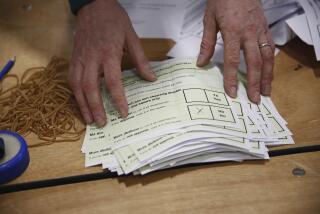Past Slows N. Ireland’s Future Peace
BELFAST, Northern Ireland — It’s been 30 years since a Protestant mob showed up with guns at Kathy Nolan’s door, ordered her family out and then burned down the street.
But it’s the first thing the Roman Catholic mother of four remembers when asked whether the time has come for the Irish Republican Army to hand over its weapons, what locals term “decommissioning.”
“In 1969, there was no one to stop the loyalists,” she says, claiming Protestant police officers did nothing to intervene. “It’s not that the nationalist people don’t want to decommission, it’s that we’re scared to decommission.”
The Northern Ireland peace agreement--announced with great fanfare just a year ago--snagged this week on the issue of disarming the IRA.
After four days of arm-twisting, British Prime Minister Tony Blair on Thursday sent political leaders away for a two-week “pause for reflection.” But he made it clear that, when they come back for more talks, he expects them to sign on to a new proposal under which the IRA would have to start giving up guns before its political allies, Sinn Fein, could take office in a power-sharing government.
Blair presented the proposal as requiring compromise on both sides. But analysts say the greatest pressure at the moment is on Sinn Fein, because, under Blair’s formula, the peace process cannot move forward without some form of IRA disarmament.
Call for Bilateral Disarmament
That means the fate of last year’s Good Friday agreement may depend on whether Nolan and her neighbors can change their minds and face a future without the protection of IRA weapons.
She doesn’t want the IRA to keep their guns forever, Nolan says. But she still feels defenseless without them.
“There’s no pressure being put on the loyalists to decommission,” she says, watching her three daughters cavort in a West Belfast shopping mall. “I don’t think the IRA should give up any guns. Decommissioning has to go straight down the line on both sides.”
Her neighborhood off the Catholic Falls Road is a stronghold of support for the IRA and Sinn Fein. Shops and homes are draped in green, white and orange bunting, the colors of the Republic of Ireland, which many hope one day to join.
Subtle signs of change can be detected since last year’s peace agreement. Where graffiti once screamed “Brits Out,” some wall scrawls now demand political power within Northern Ireland: “Political Status Now” and “145,000 Votes,” the latter a reference to the 17% of the vote Sinn Fein won in elections last summer to the new Northern Ireland Assembly.
But old fears linger. Nearly everyone who pauses to chat while hurrying to finish holiday shopping recalls the 1969 riots, when, they say, a poorly armed IRA was powerless to protect them as loyalists burned them out of their homes.
“It would be different if there was an unbiased police force to enforce the laws,” says 42-year-old Marion O’Neill. “But the IRA is the only protection the Catholic people have.”
Blair shapes the discussion differently, saying security issues and political issues must be resolved in tandem. In his view, disarmament needs to take place alongside moves to establish the joint Protestant-Catholic government outlined in the peace deal.
Chance to Take Moral High Ground Lost
Clearly, trust is scarce at the moment. Both pro-British loyalists and largely Catholic nationalists hold deep fears of the other side’s ability to relaunch a terrorist war in the British province.
But the onus is on Sinn Fein at the moment. Political parties affiliated with loyalist paramilitaries fared poorly at the ballot box last summer and did not get enough support to be seated in the province’s executive Cabinet. Sinn Fein, on the other hand, is entitled to two of 10 seats--which will give it formal political power for the first time.
“It’s not right to be given that level of power in a democratic country and still have arms at your disposal,” says Sidney Elliott, a political analyst at Belfast’s Queen’s University.
Sinn Fein insists that it cannot control the IRA and cannot make it hand over weapons--assertions unionists and the British and Irish governments view with skepticism, as they see the two organizations as inextricably linked.
Elliott says the IRA has made a tactical error: If it had moved earlier to disarm, it would have retained the moral high ground and had greater control over the process.
“Now it’s going to be harder for them to swallow what comes next,” he says.
That certainly seems the case outside Curley’s supermarket, where Martin Bellew, 25, seems prepared for new street battles.
“Why should we give up our guns when they won’t give up theirs?” he asks. “Decommissioning would have to be done on their side first. Otherwise, we’ll be left with nothing except sticks and stones.”
But many of those demanding the hand-over of IRA weapons are less concerned about guns that could be used to defend streets and homes. What gives them pause are the IRA’s estimated several tons of Semtex plastic explosive--more than enough to fuel a massive bombing campaign.
More to Read
Sign up for Essential California
The most important California stories and recommendations in your inbox every morning.
You may occasionally receive promotional content from the Los Angeles Times.










